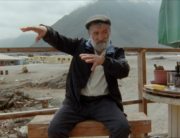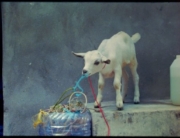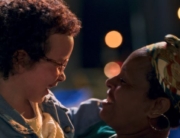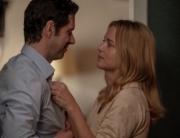Only is the sort of film that makes you realize how routine the post-apocalyptic genre has become, particularly if there is a political slant. I don’t mean to suggest that the genre has gone completely fallow, nor that this movie doesn’t have an intriguing premise. Yet when something does not work, and Only ultimately doesn’t, we are better able to see how certain impulses can feel routine when not brought to the zenith of their best execution. Only is an earnest film that captures the attention of some audience members more than others. The flaws ultimately lie in the writing.
Its premise is one that I’m surprised has not yet been done: a disease is killing all women on Earth, to the extent that government agencies are looking for women to trap and quarantine them, and they are offering rewards to anyone who can capture them so that they can be forced to have children. Eva (Freida Pinto), perhaps the only free woman left, and her boyfriend, Will (Leslie Odom Jr.), venture out into the wilderness after having lived in a self-imposed quarantine for some time. Their purpose in doing this remains unclear until the very end.
Though there is much explicating about the situation, the film is ultimately about their relationship and how the particulars of the catastrophe change it. It is told partially in flashbacks. Often close-ups of hands and the intimate sound of the couple’s whispering voices signal that the real focus of the film lies on them. In this way, Only aspires to be as much about human beings as it is about ideas.
Yet these two humans are scarcely believable, and I watched the entire film trying to figure out why exactly I felt this way. It is certainly no fault of the actors, who do the best they can with the material at hand. Pinto portrays Eva with sensitivity and depth that transcend the confines of her role, as does Leslie Odom Jr. The filmmakers went to great lengths to give them a backstory, yet somehow it’s hard to take their actions seriously. In one scene, Will waits in a hospital made frantic by the onset of the disease, and he manages to figure out that only women are affected by the airborne disease and to realize this just in the nick of time to get his girlfriend to safety and quarantine her. He also discovers where in the hospital he can get protective suits—all of which, in the heat of the moment, seems unlikely. If he could figure it out so fast, why hasn’t every man done the same?
The film’s greatest flaw lies in director Takashi Doscher’s decision to favor exposition and dialogue above all else. One feels that the filmmakers were anxious that we might not understand every single piece of research and world-building that went into the film—we are rarely allowed the opportunity to simply live in this world and see what happens.
Some audience members gasped at certain grisly details, particularly regarding how men pursue the remaining women like bounty hunters. For me, these moments did not land. I did not feel that I was in a world populated by living and breathing humans. Any world, be it past or future or completely imaginary, needs them, in some sense, to be truly believable.







Leave A Comment